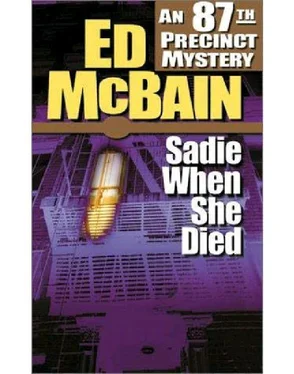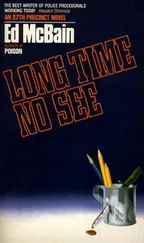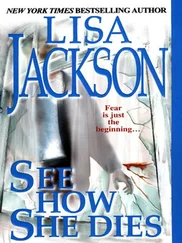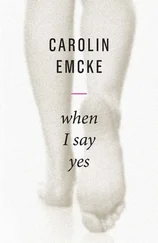Ed McBain - Sadie When She Died
Здесь есть возможность читать онлайн «Ed McBain - Sadie When She Died» весь текст электронной книги совершенно бесплатно (целиком полную версию без сокращений). В некоторых случаях можно слушать аудио, скачать через торрент в формате fb2 и присутствует краткое содержание. Жанр: Полицейский детектив, на английском языке. Описание произведения, (предисловие) а так же отзывы посетителей доступны на портале библиотеки ЛибКат.
- Название:Sadie When She Died
- Автор:
- Жанр:
- Год:неизвестен
- ISBN:нет данных
- Рейтинг книги:4 / 5. Голосов: 1
-
Избранное:Добавить в избранное
- Отзывы:
-
Ваша оценка:
- 80
- 1
- 2
- 3
- 4
- 5
Sadie When She Died: краткое содержание, описание и аннотация
Предлагаем к чтению аннотацию, описание, краткое содержание или предисловие (зависит от того, что написал сам автор книги «Sadie When She Died»). Если вы не нашли необходимую информацию о книге — напишите в комментариях, мы постараемся отыскать её.
Sadie When She Died — читать онлайн бесплатно полную книгу (весь текст) целиком
Ниже представлен текст книги, разбитый по страницам. Система сохранения места последней прочитанной страницы, позволяет с удобством читать онлайн бесплатно книгу «Sadie When She Died», без необходимости каждый раз заново искать на чём Вы остановились. Поставьте закладку, и сможете в любой момент перейти на страницу, на которой закончили чтение.
Интервал:
Закладка:
Back at the ranch, they weren’t shooting a movie. They were standing in an informal triangle around Gerald Fletcher, and raising their eyebrows at the answers he gave them. The three points of the triangle were Detective-Lieutenant Peter Byrnes and Detectives Meyer and Carella. Fletcher sat in a chair with his arms crossed over his chest. He was still wearing homburg, muffler, overcoat, and gloves, as if he expected to be called outdoors at any moment and wanted to be fully prepared for the inclement weather. The interrogation was being conducted in a windowless cubicle euphemistically labeled on its frosted glass door INTERROGATION ROOM . Opulently furnished in Institutional Wood, circa 1919, the room sported a long table, two straight-backed chairs, and a framed mirror. The mirror hung on a wall opposite the table. It was (heh-heh) a one-way mirror, which meant that on this side you saw your own reflection when you looked into the glass, but if you were standing on the other side, you could look into the room and observe all sorts of criminal behavior while remaining unseen yourself; devious are the ways of law enforcers the world over. Devious, too, are the ways of criminals; there was not a single criminal in the entire city who did not recognize a one-way mirror the minute he laid eyes upon it. Quite often, in fact, criminals with a comic flair had been known to approach the mirror, place a thumb to the nose, and waggle the fingers of the hand as a gesture of esteem and affection to the eavesdropping cops on the other side of the glass. In such ways were mutual respect and admiration built between the men who broke the law and the men who tried to uphold it. Crime does not pay—but it doesn’t hurt to have a few laughs along the way, as Euripides once remarked.
The cops standing in their loose triangle around Gerald Fletcher were amazed but not too terribly amused by his honesty; or, to be more exact, his downright brutal frankness. It was one thing to discuss the death of one’s spouse without frills or furbelows; it was quite another to court lifelong imprisonment in a state penitentary. Gerald Fletcher seemed to be doing precisely that.
“I hated her guts,” he said, and Meyer raised his eyebrows and glanced at Byrnes, who in turn raised his eyebrows and glanced at Carella, who was facing the one-way mirror and had the opportunity of witnessing his own reflection raising its eyebrows.
“Mr. Fletcher,” Byrnes said, “I know you understand your rights, as we explained them to you . . .”
“I understood them long before you explained them,” Fletcher said.
“And I know you’ve chosen to answer our questions without an attorney present . . .”
“I am an attorney.”
“What I meant . . .”
“I know what you meant. Yes, I’m willing to answer any and all questions without counsel.”
“I still feel I must warn you that a woman has been murdered . . .”
“Yes, my dear, wonderful wife,” Fletcher said sarcastically.
“Which is a serious crime . . .”
“Which, among felonies, may very well be the choicest of the lot,” Fletcher said.
“Yes,” Byrnes said. He was not an articulate man, but he felt somewhat tongue-tied in Fletcher’s presence. Bullet-headed, hair turning from iron-gray to ice-white (slight bald spot beginning to show at the back), blue-eyed, built like a compact linebacker for the Minnesota Vikings, Byrnes straightened the knot in his tie, cleared his throat, and looked to his colleagues for support. Both Meyer and Carella were watching their shoelaces.
“Well, look,” Byrnes said, “if you understand what you’re doing, go right ahead. We warned you.”
“Indeed you have warned me. Repeatedly. I can’t imagine why,” Fletcher said, “since I don’t feel myself to be in any particular danger. My wife is dead, someone killed the bitch. But it was not me.”
“Well, it’s nice to have your assurance of that, Mr. Fletcher, but your assurance alone doesn’t necessarily still our doubts,” Carella said, hearing the words and wondering where the hell they were coming from. He was, he realized, trying to impress Fletcher, trying to ward off the man’s obvious condescension by courting his acceptance. Look at me, he was pleading, listen to me . I’m not just a dumb bull, I’m a man of sensitivity and intelligence, able to understand your vocabulary, your sarcasm, and even your vituperative wit. Half-sitting upon, half-leaning against the scarred wooden table, a tall athletic-looking man with straight brown hair, brown eyes curiously slanted downwards, Carella folded his arms across his chest in unconscious imitation of Fletcher. The moment he realized what he was doing, he uncrossed his arms at once, and stared intently at Fletcher, waiting for an answer. Fletcher stared intently back.
“Well?” Carella said.
“Well what, Detective Carella?”
“Well, what do you have to say?”
“About what?”
“How do we know it wasn’t you who stabbed her?”
“To begin with,” Fletcher said, “there were signs of forcible entry in the kitchen and hasty departure in the bedroom—witness the wide-open window in the aforementioned room, and the shattered window in the latter. The drawers in the dining-room sideboard were open . . .”
“You’re a very observant person,” Meyer said suddenly. “Did you notice all this in the four minutes it took you to enter the apartment and call the police?”
“It’s my job to be an observant person,” Fletcher said, “but to answer your question, no. I noticed all this after I had spoken to Detective Carella here, and while he was on the phone reporting to your lieutenant. I might add that I’ve lived in that apartment on Silvermine Oval for the past twelve years, and that it doesn’t take a particularly sharp-eyed man to notice that a bedroom window is smashed or a kitchen window open. Nor does it take a sleuth to realize that the family silver has been pilfered—especially when there are several serving spoons, soup ladles, and butter knives scattered on the bedroom floor beneath the shattered window. Have you checked the alleyway below the window? You’re liable to find your murderer still lying there.”
“Your apartment is on the second floor, Mr. Fletcher,” Meyer said.
“Which is why I suggested he might still be there,” Fletcher answered. “Nursing a broken leg or a fractured skull.”
“In all my years of experience,” Meyer said, and Carella suddenly realized that he , too, was trying to impress Fletcher, “I have never known a criminal to jump out a window on the second floor of a building.” (Carella was surprised he hadn’t used the word “defenestrate.”)
“ This criminal may have had good reason for imprudent action,” Fletcher said. “He had just killed a woman, probably after coming upon her unexpectedly in an apartment he thought was empty. He had heard someone opening the front door, and had realized he could not leave the apartment the way he’d come in, the kitchen being too close to the entrance. He undoubtedly figured he would rather risk a broken leg than the penitentiary for life. How does that portrait compare to those of other Criminals You Have Known?”
“I’ve known lots of criminals,” Meyer said inanely, “and some of them are too smart for their own damn good.” He felt idiotic even as he delivered his little preachment, but Fletcher had a way of making a man feel like a cretin. Meyer ran his hand self-consciously over his bald pate, his eyes avoiding the glances of Carella and Byrnes. Somehow, he felt he had let them all down. Somehow, a rapier thrust had been called for, and he had delivered only a puny mumbletypeg penknife flip. “What about that knife, Mr. Fletcher?” he said. “Ever see it before?”
Читать дальшеИнтервал:
Закладка:
Похожие книги на «Sadie When She Died»
Представляем Вашему вниманию похожие книги на «Sadie When She Died» списком для выбора. Мы отобрали схожую по названию и смыслу литературу в надежде предоставить читателям больше вариантов отыскать новые, интересные, ещё непрочитанные произведения.
Обсуждение, отзывы о книге «Sadie When She Died» и просто собственные мнения читателей. Оставьте ваши комментарии, напишите, что Вы думаете о произведении, его смысле или главных героях. Укажите что конкретно понравилось, а что нет, и почему Вы так считаете.












